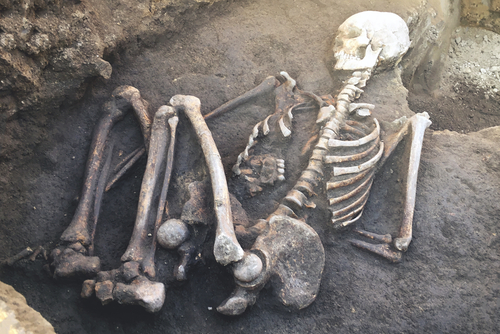Archaeologists have startlingly discovered ancient Roman graves filled with mysterious curse tablets at the site of Orléans’ former Porte Madeleine hospital.
Significance of the Discovery
Excavations at the former Porte Madeleine hospital in Orléans, France, uncovered over 76 graves belonging to Roman-era males aged between 20 and 50. It suggests a unique burial ground due to the unusual demographic density. Archaeologists also revealed 22 curse tablets, known as defixio. These artifacts, inscribed with curses, invoked Roman gods to punish adversaries, offering significant insight into how Romans intertwined magic with their daily lives.
Separation from the circles were 22 small children about one years of age were buried in a well nearby. pic.twitter.com/fOJfqXPImN
— MrsMamaCarter (@MRSCARTERPNW) February 4, 2025
Such discoveries provide a deeper understanding of funerary customs from this era, showcasing the blend of life, death, and spirituality. The site dates from the late 1st century AD to the mid-3rd century AD, when Orléans was known as Cenabum in Roman Gaul.
Details of the Defixio Tablets
Defixio tablets in several graves were thin lead sheets, often rolled or folded. Their purpose was to summon supernatural aid against wrongdoers, underscoring the belief in divine intervention. Archaeologists managed to decipher two tablets: one in Gallic invoking Mars and another in Latin invoking Mercury, indicating the authorship by commoners, slaves, or traders seeking justice.
Dijon, France
— MrsMamaCarter (@MRSCARTERPNW) February 4, 2025
This month archaeologists uncovered 13 circular graves dating back to the Second Iron Age 450-25 BC.
No symbolism or identifying information accept each body had a black arm band wrapped around each arm. This could mean many things. We will understand more once… pic.twitter.com/geskOkk6lt
“They are fragile sheets of lead with an inscription intended to harm one or more people – the ones we found are either rolled or folded. The tablets were often written by individuals seeking justice or to exert spells on enemies or rivals, or even to protect personal objects.” – Ms. Millereux and Mr. Courtois.
Chthonian gods played a prominent role, as the tablets were strategically placed underground within graves to channel curses effectively. This practice highlights the Romans’ engagement with magical and religious practices during antiquity.
Continuing Research and Implications
Archaeologists aim to decipher more tablets and study the human remains to understand the site’s significance better. Curse tablets in the graves suggest that the deceased served as intercessors for these rituals rather than targets. This revelation opens new avenues for research on Roman cultural influence extending to French localities during antiquity.
“The objective was to raise supernatural aid to bind someone under the control of the person who laid the curse. The authors of these tablets were usually anonymous individuals seeking magical or divine help.” – Ms. Millereux and Mr. Courtois.
This remarkable finding at Orléans’ Porte Madeleine hospital enhances our knowledge of Roman-era rituals and reinforces the region’s historical significance as a once-thriving part of the Roman Empire.
Sources:
https://www.dailymail.co.uk/news/article-14371497/cursed-skeletons-Roman-gods-tablets.html
https://www.dailymail.co.uk/news/article-14371497/cursed-skeletons-Roman-gods-tablets.html

